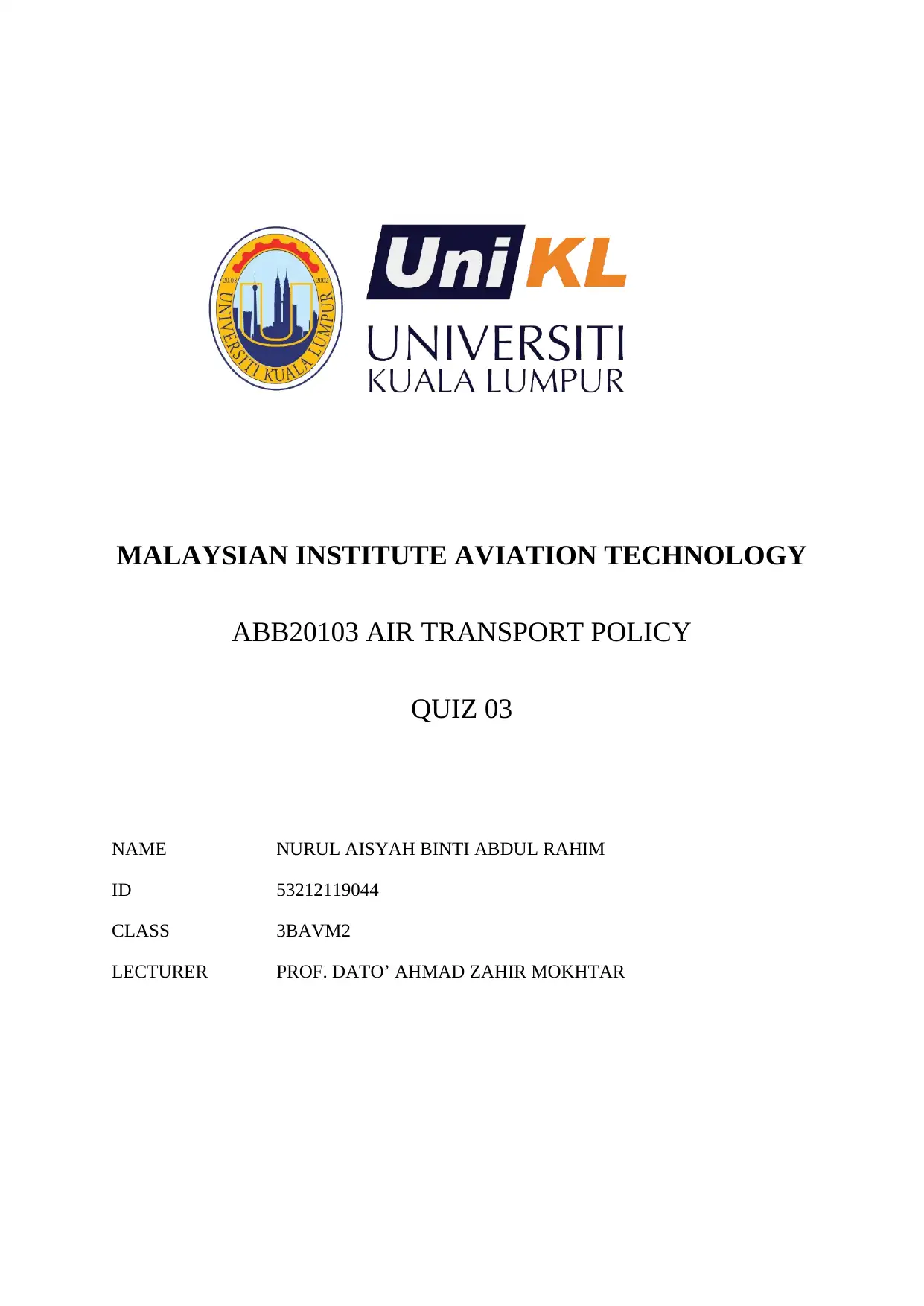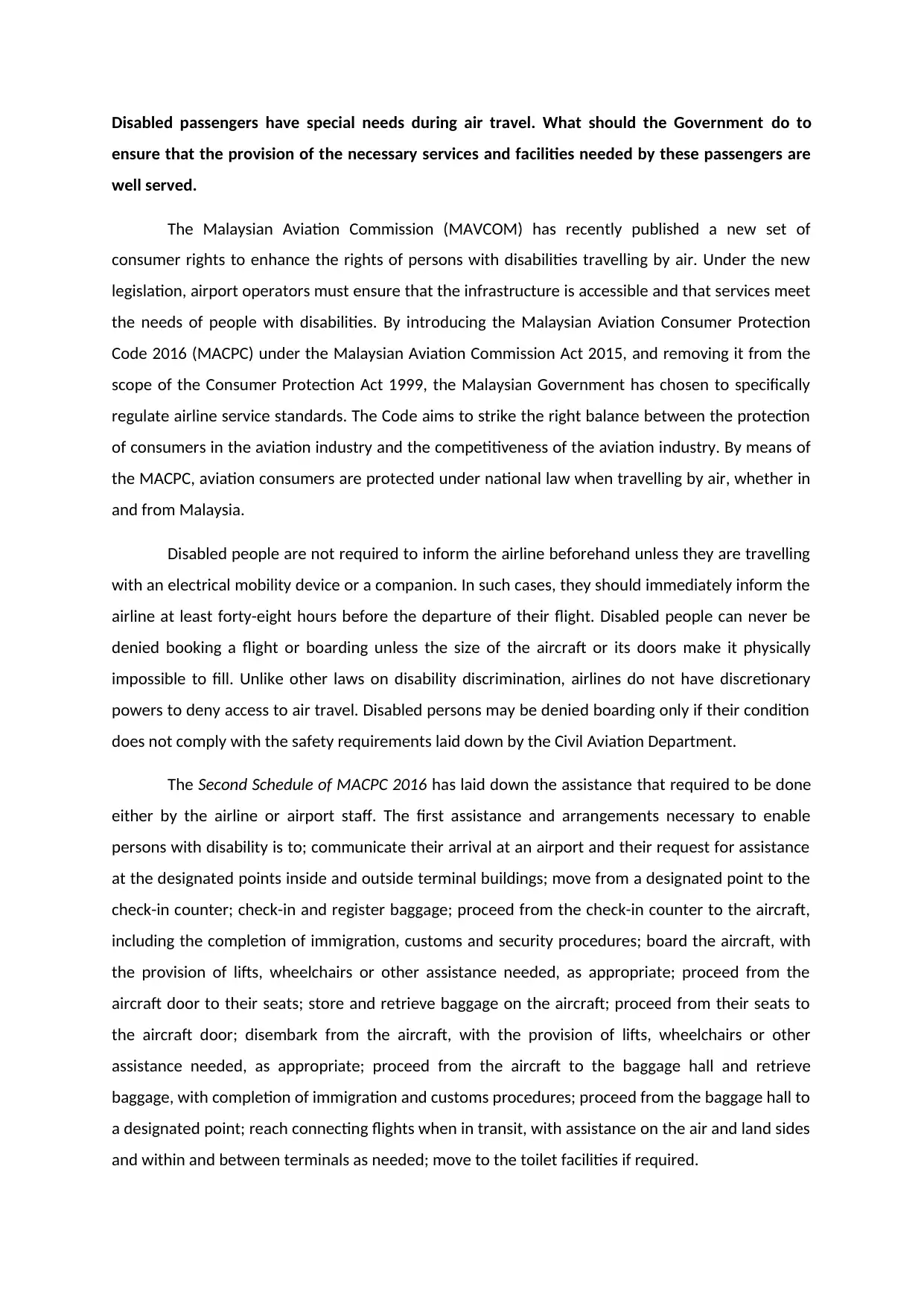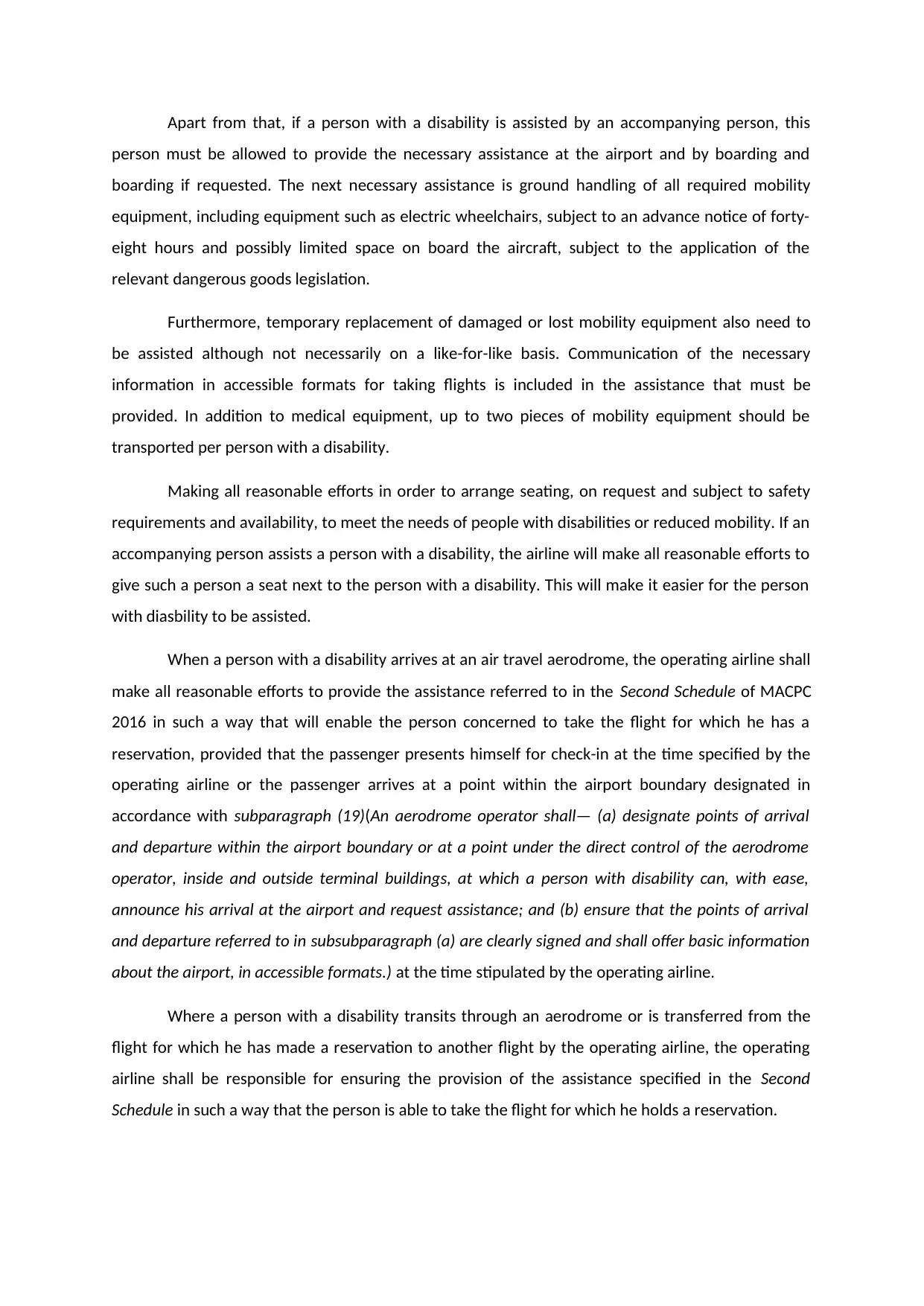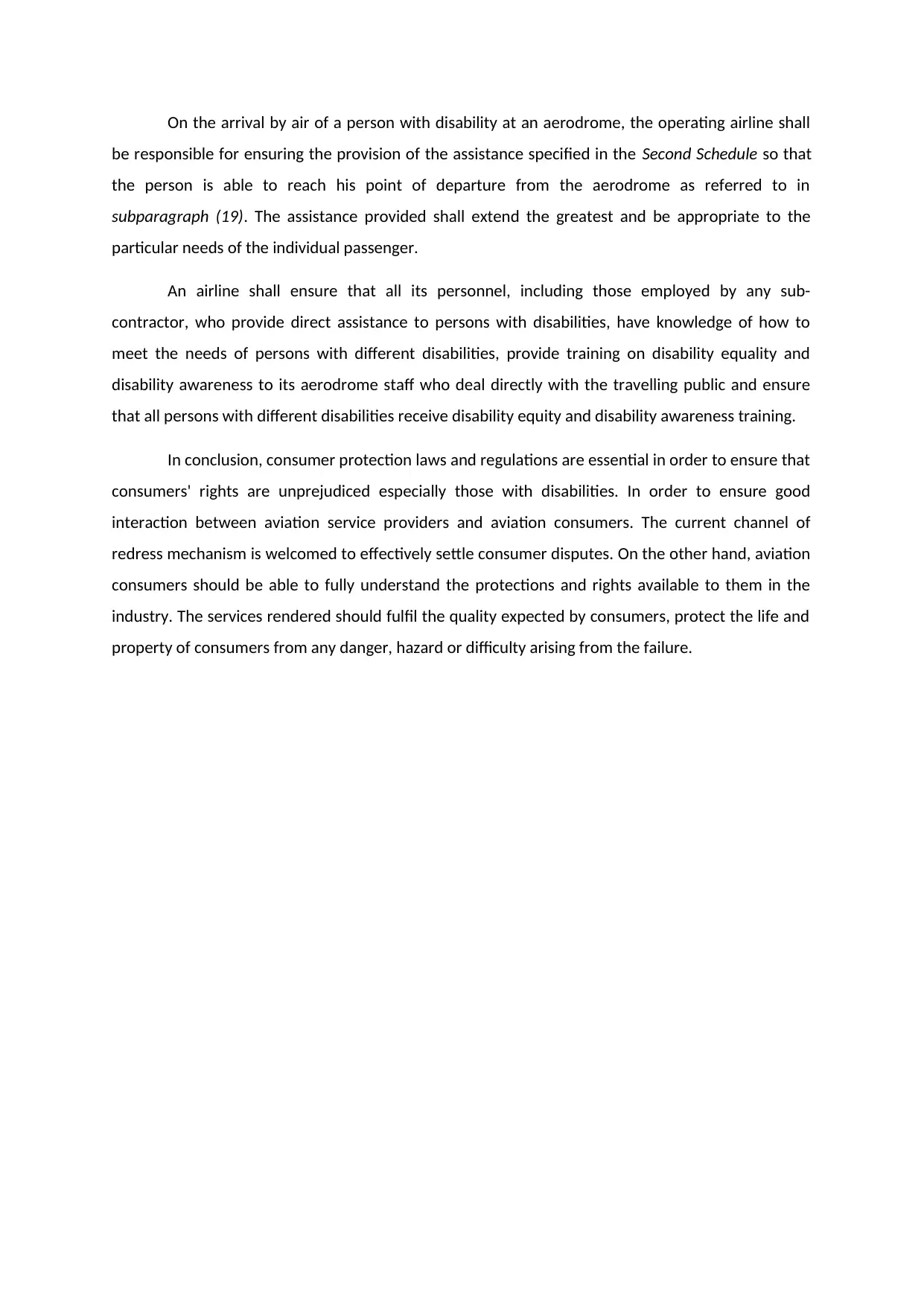Malaysian Institute Aviation Quiz 03 - ABB20103 Air Transport Policy
VerifiedAdded on 2020/11/09
|4
|1292
|277
Quiz and Exam
AI Summary
This assignment provides a detailed analysis of Malaysia's air transport policy, specifically focusing on the rights and services afforded to disabled passengers. The solution highlights the role of the Malaysian Aviation Commission (MAVCOM) and the Malaysian Aviation Consumer Protection Code 2016 (MACPC) in ensuring accessibility and necessary assistance for individuals with disabilities. The document outlines the government's responsibilities in providing infrastructure and services, including communication of arrival, check-in, boarding, disembarking, and baggage handling. It emphasizes the importance of accessible formats, mobility equipment transport, seating arrangements, and staff training. Furthermore, the assignment underscores the significance of consumer protection laws and redress mechanisms in safeguarding the rights of disabled passengers and promoting a positive interaction between aviation service providers and consumers.

MALAYSIAN INSTITUTE AVIATION TECHNOLOGY
ABB20103 AIR TRANSPORT POLICY
QUIZ 03
NAME NURUL AISYAH BINTI ABDUL RAHIM
ID 53212119044
CLASS 3BAVM2
LECTURER PROF. DATO’ AHMAD ZAHIR MOKHTAR
ABB20103 AIR TRANSPORT POLICY
QUIZ 03
NAME NURUL AISYAH BINTI ABDUL RAHIM
ID 53212119044
CLASS 3BAVM2
LECTURER PROF. DATO’ AHMAD ZAHIR MOKHTAR
Paraphrase This Document
Need a fresh take? Get an instant paraphrase of this document with our AI Paraphraser

Disabled passengers have special needs during air travel. What should the Government do to
ensure that the provision of the necessary services and facilities needed by these passengers are
well served.
The Malaysian Aviation Commission (MAVCOM) has recently published a new set of
consumer rights to enhance the rights of persons with disabilities travelling by air. Under the new
legislation, airport operators must ensure that the infrastructure is accessible and that services meet
the needs of people with disabilities. By introducing the Malaysian Aviation Consumer Protection
Code 2016 (MACPC) under the Malaysian Aviation Commission Act 2015, and removing it from the
scope of the Consumer Protection Act 1999, the Malaysian Government has chosen to specifically
regulate airline service standards. The Code aims to strike the right balance between the protection
of consumers in the aviation industry and the competitiveness of the aviation industry. By means of
the MACPC, aviation consumers are protected under national law when travelling by air, whether in
and from Malaysia.
Disabled people are not required to inform the airline beforehand unless they are travelling
with an electrical mobility device or a companion. In such cases, they should immediately inform the
airline at least forty-eight hours before the departure of their flight. Disabled people can never be
denied booking a flight or boarding unless the size of the aircraft or its doors make it physically
impossible to fill. Unlike other laws on disability discrimination, airlines do not have discretionary
powers to deny access to air travel. Disabled persons may be denied boarding only if their condition
does not comply with the safety requirements laid down by the Civil Aviation Department.
The Second Schedule of MACPC 2016 has laid down the assistance that required to be done
either by the airline or airport staff. The first assistance and arrangements necessary to enable
persons with disability is to; communicate their arrival at an airport and their request for assistance
at the designated points inside and outside terminal buildings; move from a designated point to the
check-in counter; check-in and register baggage; proceed from the check-in counter to the aircraft,
including the completion of immigration, customs and security procedures; board the aircraft, with
the provision of lifts, wheelchairs or other assistance needed, as appropriate; proceed from the
aircraft door to their seats; store and retrieve baggage on the aircraft; proceed from their seats to
the aircraft door; disembark from the aircraft, with the provision of lifts, wheelchairs or other
assistance needed, as appropriate; proceed from the aircraft to the baggage hall and retrieve
baggage, with completion of immigration and customs procedures; proceed from the baggage hall to
a designated point; reach connecting flights when in transit, with assistance on the air and land sides
and within and between terminals as needed; move to the toilet facilities if required.
ensure that the provision of the necessary services and facilities needed by these passengers are
well served.
The Malaysian Aviation Commission (MAVCOM) has recently published a new set of
consumer rights to enhance the rights of persons with disabilities travelling by air. Under the new
legislation, airport operators must ensure that the infrastructure is accessible and that services meet
the needs of people with disabilities. By introducing the Malaysian Aviation Consumer Protection
Code 2016 (MACPC) under the Malaysian Aviation Commission Act 2015, and removing it from the
scope of the Consumer Protection Act 1999, the Malaysian Government has chosen to specifically
regulate airline service standards. The Code aims to strike the right balance between the protection
of consumers in the aviation industry and the competitiveness of the aviation industry. By means of
the MACPC, aviation consumers are protected under national law when travelling by air, whether in
and from Malaysia.
Disabled people are not required to inform the airline beforehand unless they are travelling
with an electrical mobility device or a companion. In such cases, they should immediately inform the
airline at least forty-eight hours before the departure of their flight. Disabled people can never be
denied booking a flight or boarding unless the size of the aircraft or its doors make it physically
impossible to fill. Unlike other laws on disability discrimination, airlines do not have discretionary
powers to deny access to air travel. Disabled persons may be denied boarding only if their condition
does not comply with the safety requirements laid down by the Civil Aviation Department.
The Second Schedule of MACPC 2016 has laid down the assistance that required to be done
either by the airline or airport staff. The first assistance and arrangements necessary to enable
persons with disability is to; communicate their arrival at an airport and their request for assistance
at the designated points inside and outside terminal buildings; move from a designated point to the
check-in counter; check-in and register baggage; proceed from the check-in counter to the aircraft,
including the completion of immigration, customs and security procedures; board the aircraft, with
the provision of lifts, wheelchairs or other assistance needed, as appropriate; proceed from the
aircraft door to their seats; store and retrieve baggage on the aircraft; proceed from their seats to
the aircraft door; disembark from the aircraft, with the provision of lifts, wheelchairs or other
assistance needed, as appropriate; proceed from the aircraft to the baggage hall and retrieve
baggage, with completion of immigration and customs procedures; proceed from the baggage hall to
a designated point; reach connecting flights when in transit, with assistance on the air and land sides
and within and between terminals as needed; move to the toilet facilities if required.

Apart from that, if a person with a disability is assisted by an accompanying person, this
person must be allowed to provide the necessary assistance at the airport and by boarding and
boarding if requested. The next necessary assistance is ground handling of all required mobility
equipment, including equipment such as electric wheelchairs, subject to an advance notice of forty-
eight hours and possibly limited space on board the aircraft, subject to the application of the
relevant dangerous goods legislation.
Furthermore, temporary replacement of damaged or lost mobility equipment also need to
be assisted although not necessarily on a like-for-like basis. Communication of the necessary
information in accessible formats for taking flights is included in the assistance that must be
provided. In addition to medical equipment, up to two pieces of mobility equipment should be
transported per person with a disability.
Making all reasonable efforts in order to arrange seating, on request and subject to safety
requirements and availability, to meet the needs of people with disabilities or reduced mobility. If an
accompanying person assists a person with a disability, the airline will make all reasonable efforts to
give such a person a seat next to the person with a disability. This will make it easier for the person
with diasbility to be assisted.
When a person with a disability arrives at an air travel aerodrome, the operating airline shall
make all reasonable efforts to provide the assistance referred to in the Second Schedule of MACPC
2016 in such a way that will enable the person concerned to take the flight for which he has a
reservation, provided that the passenger presents himself for check-in at the time specified by the
operating airline or the passenger arrives at a point within the airport boundary designated in
accordance with subparagraph (19)(An aerodrome operator shall— (a) designate points of arrival
and departure within the airport boundary or at a point under the direct control of the aerodrome
operator, inside and outside terminal buildings, at which a person with disability can, with ease,
announce his arrival at the airport and request assistance; and (b) ensure that the points of arrival
and departure referred to in subsubparagraph (a) are clearly signed and shall offer basic information
about the airport, in accessible formats.) at the time stipulated by the operating airline.
Where a person with a disability transits through an aerodrome or is transferred from the
flight for which he has made a reservation to another flight by the operating airline, the operating
airline shall be responsible for ensuring the provision of the assistance specified in the Second
Schedule in such a way that the person is able to take the flight for which he holds a reservation.
person must be allowed to provide the necessary assistance at the airport and by boarding and
boarding if requested. The next necessary assistance is ground handling of all required mobility
equipment, including equipment such as electric wheelchairs, subject to an advance notice of forty-
eight hours and possibly limited space on board the aircraft, subject to the application of the
relevant dangerous goods legislation.
Furthermore, temporary replacement of damaged or lost mobility equipment also need to
be assisted although not necessarily on a like-for-like basis. Communication of the necessary
information in accessible formats for taking flights is included in the assistance that must be
provided. In addition to medical equipment, up to two pieces of mobility equipment should be
transported per person with a disability.
Making all reasonable efforts in order to arrange seating, on request and subject to safety
requirements and availability, to meet the needs of people with disabilities or reduced mobility. If an
accompanying person assists a person with a disability, the airline will make all reasonable efforts to
give such a person a seat next to the person with a disability. This will make it easier for the person
with diasbility to be assisted.
When a person with a disability arrives at an air travel aerodrome, the operating airline shall
make all reasonable efforts to provide the assistance referred to in the Second Schedule of MACPC
2016 in such a way that will enable the person concerned to take the flight for which he has a
reservation, provided that the passenger presents himself for check-in at the time specified by the
operating airline or the passenger arrives at a point within the airport boundary designated in
accordance with subparagraph (19)(An aerodrome operator shall— (a) designate points of arrival
and departure within the airport boundary or at a point under the direct control of the aerodrome
operator, inside and outside terminal buildings, at which a person with disability can, with ease,
announce his arrival at the airport and request assistance; and (b) ensure that the points of arrival
and departure referred to in subsubparagraph (a) are clearly signed and shall offer basic information
about the airport, in accessible formats.) at the time stipulated by the operating airline.
Where a person with a disability transits through an aerodrome or is transferred from the
flight for which he has made a reservation to another flight by the operating airline, the operating
airline shall be responsible for ensuring the provision of the assistance specified in the Second
Schedule in such a way that the person is able to take the flight for which he holds a reservation.
⊘ This is a preview!⊘
Do you want full access?
Subscribe today to unlock all pages.

Trusted by 1+ million students worldwide

On the arrival by air of a person with disability at an aerodrome, the operating airline shall
be responsible for ensuring the provision of the assistance specified in the Second Schedule so that
the person is able to reach his point of departure from the aerodrome as referred to in
subparagraph (19). The assistance provided shall extend the greatest and be appropriate to the
particular needs of the individual passenger.
An airline shall ensure that all its personnel, including those employed by any sub-
contractor, who provide direct assistance to persons with disabilities, have knowledge of how to
meet the needs of persons with different disabilities, provide training on disability equality and
disability awareness to its aerodrome staff who deal directly with the travelling public and ensure
that all persons with different disabilities receive disability equity and disability awareness training.
In conclusion, consumer protection laws and regulations are essential in order to ensure that
consumers' rights are unprejudiced especially those with disabilities. In order to ensure good
interaction between aviation service providers and aviation consumers. The current channel of
redress mechanism is welcomed to effectively settle consumer disputes. On the other hand, aviation
consumers should be able to fully understand the protections and rights available to them in the
industry. The services rendered should fulfil the quality expected by consumers, protect the life and
property of consumers from any danger, hazard or difficulty arising from the failure.
be responsible for ensuring the provision of the assistance specified in the Second Schedule so that
the person is able to reach his point of departure from the aerodrome as referred to in
subparagraph (19). The assistance provided shall extend the greatest and be appropriate to the
particular needs of the individual passenger.
An airline shall ensure that all its personnel, including those employed by any sub-
contractor, who provide direct assistance to persons with disabilities, have knowledge of how to
meet the needs of persons with different disabilities, provide training on disability equality and
disability awareness to its aerodrome staff who deal directly with the travelling public and ensure
that all persons with different disabilities receive disability equity and disability awareness training.
In conclusion, consumer protection laws and regulations are essential in order to ensure that
consumers' rights are unprejudiced especially those with disabilities. In order to ensure good
interaction between aviation service providers and aviation consumers. The current channel of
redress mechanism is welcomed to effectively settle consumer disputes. On the other hand, aviation
consumers should be able to fully understand the protections and rights available to them in the
industry. The services rendered should fulfil the quality expected by consumers, protect the life and
property of consumers from any danger, hazard or difficulty arising from the failure.
1 out of 4
Your All-in-One AI-Powered Toolkit for Academic Success.
+13062052269
info@desklib.com
Available 24*7 on WhatsApp / Email
![[object Object]](/_next/static/media/star-bottom.7253800d.svg)
Unlock your academic potential
Copyright © 2020–2026 A2Z Services. All Rights Reserved. Developed and managed by ZUCOL.

